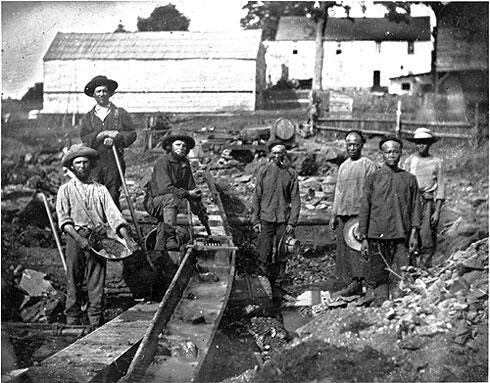California Gold Rush Miners
Miners pose for a photo during the California Gold Rush at Auburn Ravine in 1852. The photo shows both white and Chinese miners.
The gold rush in California began in January 24, 1848 in Sutter's Mill. The discovery of gold presented the promise of lifelong wealth, which appealled to national and international audiences. In 1852 $81 million (1852 value) in gold was found, but after that year gold's value decreased to about $45 million. The international audiences included mostly Chinese men. Not only were they pulled by gold, but high taxes after the Opium Wars and years of floods and droughts pushed Chinese men and women to look elsewhere for a living. Chinese miners often lived in groups and took jobs American miners did not want. Chinese men and women often faced discrimination such as, a levy of $3 per month, inability to testify in court, and robbery.
To learn more about the California gold rush visit:
https://www.pbs.org/wgbh/americanexperience/features/goldrush-california/
https://blackhawkmuseum.org/goldrush/
For more on Chinese immigration go to:
https://www.pbs.org/wgbh/americanexperience/features/goldrush-chinese-im...
http://www.pbs.org/opb/historydetectives/feature/chinese-immigration/

[Head of Auburn Ravine, 1852]. 1852. Daguerreotype. California State Library: Picture Catalog. http://catalog.library.ca.gov/F/D6B7RL946Y3GKBF8FHJFD1VM7DMKYVJB43XKVPMY... (Accessed December 27, 2018).
Public Domain
Public Domain is a copyright term that is often used when talking about copyright for creative works. Under U.S. copyright law, individual items that are in the public domain are items that are no longer protected by copyright law. This means that you do not need to request permission to re-use, re-publish or even change a copy of the item. Items enter the public domain under U.S. copyright law for a number of reasons: the original copyright may have expired; the item was created by the U.S. Federal Government or other governmental entity that views the things it creates as in the public domain; the work was never protected by copyright for some other reason related to how it was produced (for example, it was a speech that wasn't written down or recorded); or the work doesn't have enough originality to make it eligible for copyright protection.
Add a comment
PLEASE NOTE: NCpedia provides the comments feature as a way for viewers to engage with the resources. Comments are not published until reviewed by NCpedia editors at the State Library of NC, and the editors reserve the right to not publish any comment submitted that is considered inappropriate for this resource. NCpedia will not publish personal contact information in comments, questions, or responses. If you would like a reply by email, note that some email servers, such as public school accounts, are blocked from accepting messages from outside email servers or domains. If you prefer not to leave an email address, check back at your NCpedia comment for a reply. Please allow one business day for replies from NCpedia. Complete guidelines are available at https://ncpedia.org/about.